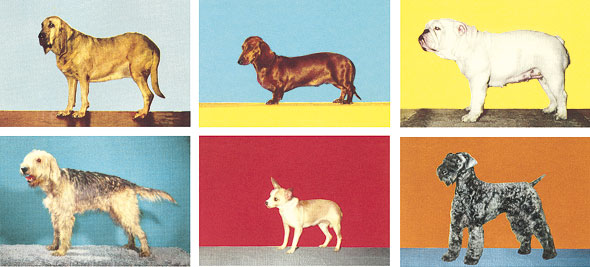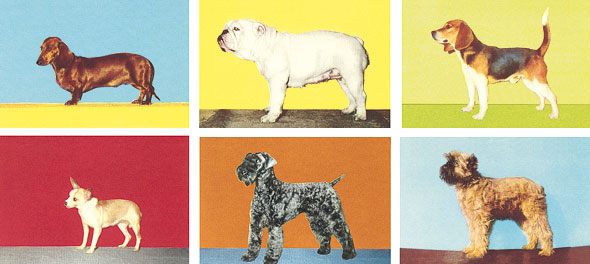See a man about a dog...
Dating from around 1325, the word is believed to refer to an image of a dog clamping its jaws on something it intends to keep.
To rub someone’s nose in it
The phrase has its origin in a practice that some people think is an effective way to house-train a puppy when he urinates inside the house: rub his nose in it.
The dog ate my homework
First reportedly uttered in 1835, by a recalcitrant student named Henry Pennywhistle. A century later, author John Steinbeck reportedly found the first draft of his novel Of Mice And Men had been chewed up by his dog.
See a man about a dog
This is commonly said by those who wish to excuse themselves from a gathering but don’t want to specify why. Its earliest known usage was in the 1866 Dion Boucicault play Flying Scud. During the Prohibition period in America, it became a code for discreetly consuming alcohol.
Put someone off the scent
Poachers fleeing from the law would drag herring across the ground where they had been walking in order to throw dogs off their scent.
Every dog has his day
Long-bodied, short-legged dogs were utilised in the big houses of Britain as ‘turnspit dogs’, continuously working a wheel attached to a roasting spit in the kitchen. The poor creatures were required to work it until the meat was cooked, which could take up to three hours. The household would alternate between dogs, and reports say that the unlucky creatures would learn which was ‘their’ day and hide.
Lie doggo
The expression means to keep still, but not necessarily because one is tired or asleep. When a dog wishes to, it can become impressively motionless, lying low and quiet, with only its eyes flickering. Thus a person going into hiding or keeping quiet about something is like a dog – still, and giving away no clues.
Barking up the wrong tree
An expression indicating that it would be a waste of energy to pursue a course of action that will not have the desired result. It has been in use in America since 1830 and is believed to have come about from racoon hunting, which is generally done in the dark. A dog that has chased a racoon up a tree and loudly announced the fact may be unaware that high above him the racoon has leapt to another tree.
It ’s raining cats and dogs
There are several dubious explanations for this expression, including a belief that the bodies of dead cats and dogs floated in gutters during heavy rain, or that thatched roofs were a favourite resting place for household pets – which often fell through!
A more probable explanation is that in ancient Northern European mythology, the god of war, Odin, was surrounded by wolves and dogs – and the dogs controlled the wind. Alongside this was the belief that witches’ cats could transform themselves into natural forces. So when Odin’s dogs became aggressive, and in the guise of wind chased the cats, the cats turned themselves into rain to escape the dogs.
Gone to the dogs
This indicates that a person has gone downhill socially in the worst way, like a street dog. The expression has two influencing factors. One is the practice of removing leftovers and food scraps from the table, or discarding provisions past their use-by date, and throwing them to the dogs. But there is a second factor, which comes from betting on dog races. Betting can become an obsession and in some cases brings financial difficulty. So ‘going to the dogs’ has yet another image of someone going downhill.

Doggy Facts
The excavation of Herculaneum, a city buried by the same volcanic eruption as Pompeii, found a mural showing a blind man being led by a dog on a leash.
Similarly, evidence was found that ancient households gave warnings about the presence of a dog. The Latin Cave Canem – Beware of the Dog – existed as an admonition 2,000 years ago.
Students at Yale University in the 19th century became humorously suspicious about what kind of meat was being sold by the local snack bars, which they began to call ‘dog wagons’. Soon the iconic American name ‘hot dog’ took root.
In 1870 the Prussian army introduced tags nicknamed Hundemarken (dog licence disc) based on Berlin’s system of licensing canines. The practice was taken up by the US Army in 1906, marking the origins of ‘dog tags’.
The Canary Islands are actually so named because of dogs. In ancient times, the islands were notorious for their fighting dogs and so, the Latin for dog being canis, the Romans used the word Canaria when referring to the place.
Dogs can hear with approximately 10 times more efficiency than humans. By one estimate, dogs can locate the source of a sound in 0.06 of a second.
A dog’s sense of smell is described by international veterinary surgeon David Taylor as literally ‘one million times more sensitive than our own’. In his book You And Your Dog, he explains that a human’s nose is equipped with an olfactory sensing area of about three square centimetres. The same facility inside the muzzle of an average dog is 130 square centimetres.
For a long time, people in Britain were forbidden from knowing about a spaniel called Flossie. Information about her was available in Italy during 1928 to a few people, then to a few more in England in 1929. But to the general public, Flossie remained hidden for the next 30 years. Why? She was the dog of gamekeeper Mellors, of Lady Chatterley’s Lover fame. The novel was published privately in Italy in 1928, followed by a small private edition in Britain in 1929. The full version of the book only became available in 1960.

Doggy superstitions
A strange dog walking into your house portends a new friendship.
Meeting a dog – especially a spotted one like a Dalmatian – is considered good luck.
A dog eating grass means it will rain soon.
If you see three white dogs together at the same time, you will have good luck.
If a newborn baby is licked by a dog, the baby will be a quick healer.
If you scratch a dog before you go jobhunting, you’ll land a good job.
If a dog scratches herself sleepily, there will soon be a change in the weather.
A dog that growls for no apparent reason is growling at a spirit.
Every Dog Has Its Day: A Thousand Things You Didn’t Know About Man’s Best Friend, by Max Cryer (Exisle Publishing, £10.95).



